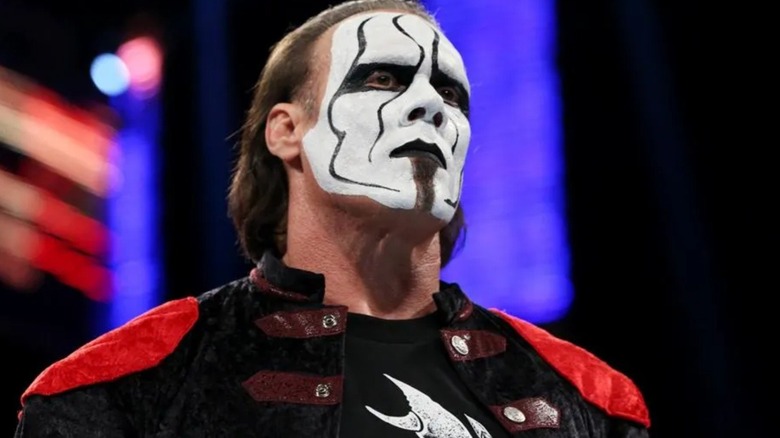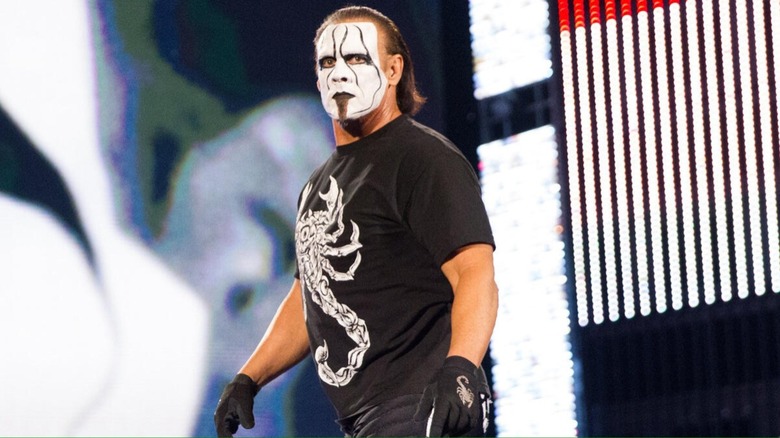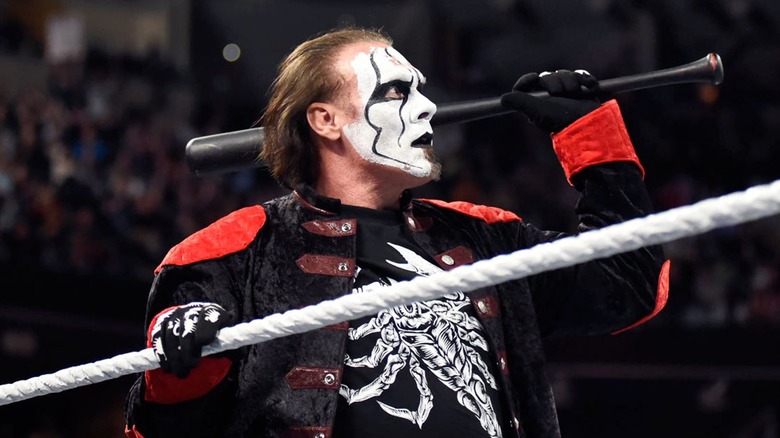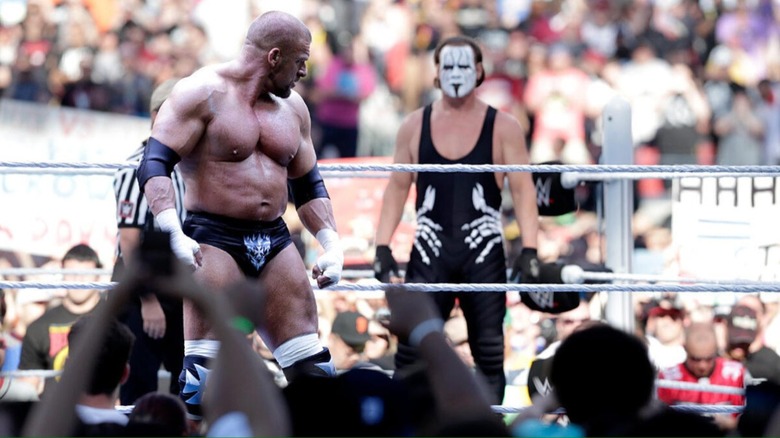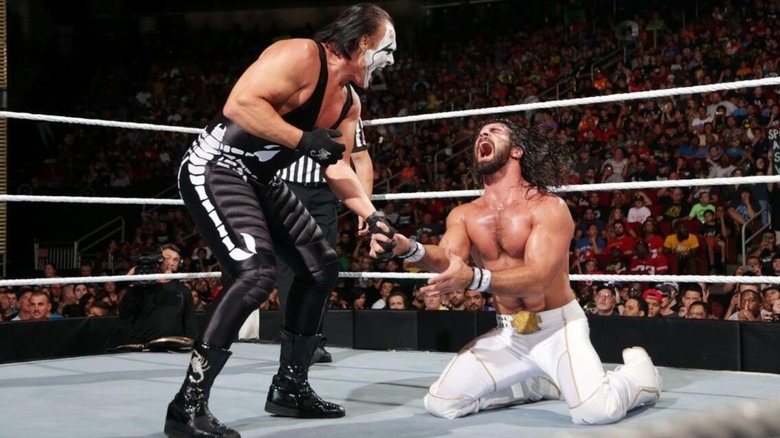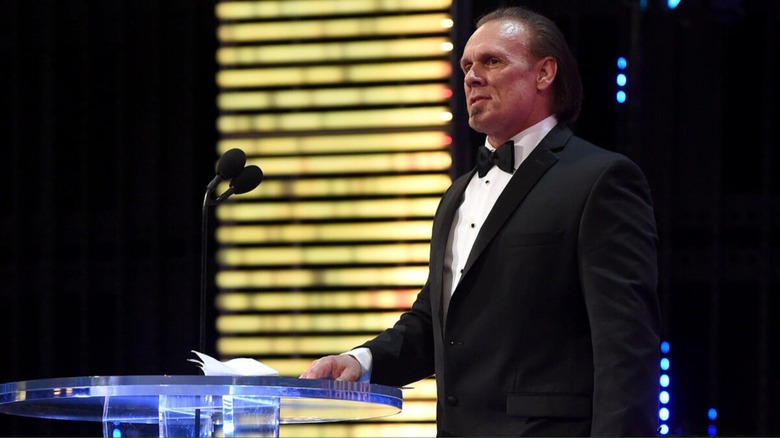The Little Known Truth About Sting's Awful WWE Run
After nearly 40 years in the wrestling business, Sting has called it a career. "The Icon" retired a champion alongside Darby Allin at AEW Revolution 2024, more than 16,000 people showering him with applause in the Greensboro Coliseum. In attendance were people who have been fans of his for years, friends he's shared the ring and the road with, and his two sons, who even got involved in the Tornado Tag Match against The Young Bucks while dressed as their dad.
Sting has been a huge part of companies like WCW, TNA, and AEW, and has made innumerable fans in Japan through his appearances for New Japan Pro Wrestling and NOAH — but the one part of his career that's often cited as the weakest in his portfolio is his brief run with the WWE. While technically under contract with WWE for six years, Sting's run on TV lasted less than one, and it wasn't exactly seen as the best usage of a wrestling legend. There are many reasons Sting's WWE tenure didn't go according to plan — here are some of the details fans might not know about his time as "The Vigilante."
Sting never originally wanted to join WWE
It's often cited as the biggest dropped ball in the history of wrestling, the rivalry that could have sold more tickets and merchandise than any other angle ever, but didn't: the WCW invasion of WWE. Following WWE's purchase of WCW in 2001, a number of WCW talents started cropping up on WWE TV, but instead of the nWo, Goldberg, or Ric Flair, it was Lance Storm, Mike Awesome, and Hugh Morrus. This was due to some of the bigger name talents being under guaranteed Time Warner contracts, meaning that they were going to be paid to sit at home.
Sting was on one of these contracts, and seemed more than willing to take a buyout like his fellow former WCW World Heavyweight Champions, Diamond Dallas Page and Booker T. It was WWE's treatment of the WCW stars, however, that cost them "The Icon." In an interview released in 2007, Sting explained that while he had no issues with Vince McMahon, he was wary of the fact that so many of WCW's biggest stars hadn't made the jump, and those who had were getting buried by WWE stars as part of the Invasion angle. In the interview, Sting points out one specific moment involving The Rock meeting then-WCW World Heavyweight Champion Booker T for the first time and asking "Who are you?"
"That one little comment was all it took to ... in my opinion, bury somebody like Booker T, and let's let the world know that you're a WCW guy and you're a peon here," Sting said. "And after all the years I'd put into wrestling at that point, it just seemed like a gamble to me."
It should be noted that the segment in question didn't go exactly as Sting described, but The Rock did ask Booker T "Who in the blue hell are you," asked his name and naturally interrupted with "It doesn't matter what your name is," and assumed Booker T was going to WWE's next PPV to help with parking. Booker T, for his part, has gone on the record that Sting missed out by not coming to WWE, eventually signing with TNA Wrestling instead.
The dream match that never was
In terms of one-off matches, there's one that many fans agree is the single biggest match that never came to be: Sting vs. The Undertaker.
While Sting and "Mean Mark" did share the ring at an NWA house show in 1990, "The Icon" never shared the ring with "The Deadman." Sting confirmed in a 2011 interview that WWE had offered him the match for WrestleMania XXVII, which took place that year, but he declined, for familiar reasons.
"Let's just say that I turned it down for the same reasons I always have," Sting said. "Something in me never trusted what would happen up there, based entirely on the track record with other WCW guys and everything that went on after Vince bought WCW."
The Undertaker wrestled Triple H at WrestleMania XXVII instead, which would prove ironic three years later, when Sting finally signed with WWE in 2014. With both men at last in the same company, a WrestleMania between them seemed inevitable, and according to Sting, he had actually pitched a match with "The Deadman" for WrestleMania XXX in January 2014, as his contract with TNA expired a few weeks earlier. By then, however, plans to have Undertaker face Brock Lesnar (who would famously break 'Taker's much-lauded WrestleMania winning streak) were already in place. Sting signed with WWE anyway, assuming he and Undertaker would get their match eventually. Sting said in 2021 that he still doesn't know why the match never happened, while 'Taker has claimed the match would have disappointed fans due to his and Sting's age.
Sting didn't appear at WrestleMania XXX, but instead made his debut at "The Showcase of the Immortals" the following year at WrestleMania 31 — against Triple H.
Sting vs. Triple H
Despite some turmoil on the injury front leading up to WrestleMania 31, most people were still excited to see Sting's WWE debut against Triple H. It was a true WWE vs. WCW dream match that seemed impossible just a few years earlier, and WWE leaned into that fact by having both the New World Order and D-Generation X making appearances at different points. The nWo's inclusion had people scratching their heads, as they were the group that Sting had his biggest feud in WCW, but that was nothing compared to what came next. After a match that could only been described as one Limp Bizkit song away from being the ultimate 1990s fever dream, Triple H defeated Sting in a decision that still has people talking to this day.
A few people have different takes on why Triple H won. "Road Dogg" Brian James who was involved in the match as a member of DX, claimed that the initial plan for WrestleMania 32 the following year after was to have Triple H take on The Rock, meaning "The Game" had to go over in order to stay strong. However, he did also have some interesting things to say about Vince McMahon in regards to the match.
"Vince did not act like he knew who Sting was, or he knew of Sting's gravitas," James said. "He literally asked us, 'Was he over?' ... I don't know if it's a performance or if it's real, but if it was a performance, he deserves an Oscar."
Sting has referred to WrestleMania 31 as "a great memory," but it's hard to imagine that in the moment, he wasn't thinking about The Rock asking Booker T who he was, and possibly wondering why he ignored his instincts and finally signed with a company run by a man who hated WCW with all his heart.
The Night Of Champions incident
Seeing Sting jump off of any and all balconies that came into his line of vision became commonplace towards the end of his run in All Elite Wrestling, which for many fans was outrageous considering how his final WWE match went.
After winning two matches on the September 14, 2014 episode of "WWE Raw," the only time he would ever wrestle on the show at all, Sting became the number one contender to Seth Rollins' WWE World Heavyweight Championship. The match took place six days later in the main event of the Night of Champions PPV — at the time, nobody knew it would be Sting's last WWE match, his last singles match, and until his AEW debut six years later, his last match of any kind.
In a 2019 episode of "WWE Untold" entitled "Sting's Last Stand," Sting went into detail about what happened, explaining that he felt an electric sensation in his fingers and running down his arms after taking a buckle bomb, but felt good enough to continue. After taking a second buckle bomb later in the match, however, "The Icon" collapsed, unable to stand.
"I could just feel the power just going out of my legs," Sting said. "I'm thinking, 'Lord God, please don't let it end like this. What a way to go out. Let me come back.'"
As doctors checked on Sting's condition, many people, including Rollins (who had to continue portraying his heel character despite genuine concern that he had just seriously injured his own childhood idol) were holding their breath. Sting was eventually able to stand, and thanks to what he referred to as "maybe a little bit of insanity," he finished the match. Though he walked out of the arena without assistance, he was immediately rushed to a hospital, where he was ultimately diagnosed with cervical spinal stenosis. Rollins apologized profusely as Sting was being loaded into the ambulance, but Sting was adamant that the injury wasn't Rollins' fault.
"There's absolutely no way that Seth had any wrongdoing, no negligence whatsoever," Sting said. "This is wrestling, for crying out loud."
First retirement at 2016 WWE Hall Of Fame ceremony
Eight years before his actual retirement at AEW Revolution 2024, Sting hung up his boots for the first time over WrestleMania weekend in 2016. "The Icon" was inducted into the WWE Hall of Fame by Ric Flair and revealed in his induction speech that he would be officially retiring from wrestling after over 30 years in the business due to the injuries he sustained the year prior. While it seemed to make sense at the time, did Sting really want to retire?
Sting revealed in an interview with WWE the week before the Hall of Fame ceremony that he chose not to have surgery following Night of Champions, claiming that he wasn't feeling any side effects that usually come with cervical spinal stenosis and that he felt completely fine. In the weeks following WrestleMania weekend, Sting admitted that he felt as if WWE was pushing him to retire. He noted that the decision was his and he had the final say, but there was a strong sense that people like Vince McMahon thought he needed to be finished in the ring.
Of course, the 2016 Hall of Fame ceremony wasn't the end of Sting's story in wrestling. Unlike many of the people he has shared a ring with over the years, Sting managed to go out on his own two feet, a legend with the respect of virtually everyone he has ever crossed paths with. It's possible that AEW fans haven't seen the last of him, but whatever happens, both Sting and his supporters are fortunate that his painfully aborted WWE stint was not the end for "The Icon."
